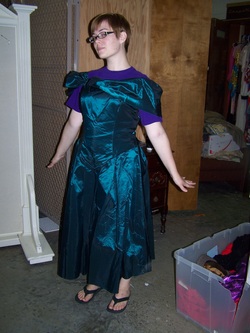|
I once overheard a statement that confused me. "Costumers have to always look good/fashionable. I mean it's there thing." The speaker was implying that other technicians can look grungy or not quite put together since their area is not dealing with clothing, makeup, or hair.  Six years ago wearing an 80's prom dress. Six years ago wearing an 80's prom dress. I disagree with this statement. It is reminiscent of a brain teaser my father once told me: "A town has two hairdressers. The first has a lovely haircut and pristine shop. The second has a patchy haircut and there is hair all over his shop. Which do you go to? The second of course. He cut the first's hair and the hair on the ground shows he has many customers." I think each costume technician should dress how he or she wants; except distressing. When distressing do NOT wear your favorite outfit. You WILL ruin it! Everyone uses clothing to express themselves. This is why the clothing industry is so big.
1 Comment
Sometimes in the theatre profession, we may need to take on a second job. If this second job is not in the theatre (which it probably won't be) it can be hard to translate experiences into phrases the interviewer will recognize. I recently got a second job to help pay for my move to graduate school. While preparing applications I began to think of how to word my experiences in a way that a non-theatre company would understand and instantly recongnize. The following is a sample of what I came up with.
There are many other things in theatre that can be translated into "interviewer speak". These three are just some that I used when applying. Ideally we should never have to take a second job, but from time to time it may be necessary. We have experience in all these areas interviewers are looking for, we just need to know how to reword them. Happy job hunting!
When I first started out working in a collegiate costume shop, our manager had a few rules. One was "No Inappropriate Shop Talk". This meant no heated discussions about politics, religion, or what one does in the bed room. And really, the latter of the three you should never really discuss in public. It's no one's business but those involved. But the other two, religion and politics do have a time and place for discussion. Know when the time and place for certain topics are and only start a riveting conversation about them at that time.
Talking about the cute thing your cat did during a budgeting meeting for your company is an example of the wrong time and place for the topic of your cat. Now, that same conversation would be a welcomed anecdote at the pet store check out or a cat lovers anonymous meeting. Everything has its time and place. |
Topics
All
Archives
July 2021
|
